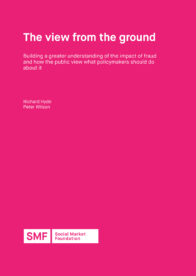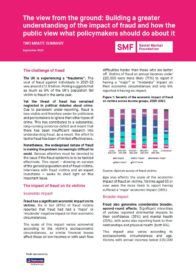The UK is experiencing an epidemic of fraud, yet the threat of it has remained neglected in political debates about crime, with insufficient research into the problem. This report investigates the extent of fraud, its economic and psychological impact on victims, and sheds new light on the public’s attitudes towards key debates on fraud policy.
SUMMARY
- The UK is experiencing a “fraudemic”. Fraud cost individuals in the UK around £12.8 billion in 2021-22, while polling suggests 9% of the UK’s population fell victim in the same year.
- Fraud has a significant economic impact on its victims. 61% reported that fraud had had a major or moderate negative impact on their economic circumstances, with those on incomes under £20,000 and those aged 65 or over hit particularly hard.
- Fraud also generates broader second-round effects. 35% and 25% of victims respectively reported negative psychological impacts on confidence and mental health, while 9% also reported harm to relationships and physical health.
- The report surveyed the public and fraud victims on a range of fraud policy issues:
- The public overwhelmingly agreed that there should be some reimbursement in all cases of fraud, but were less supportive of full reimbursement where victims enabled fraud to take place.
- The general public believe that the liability for reimbursing fraud victims should be spread widely. 57% believe digital services firms should be held liable; 60% want financial institutions holding victims’ money to be held responsible; and 62% want the financial institutions receiving fraudulently obtained assets to contribute.
- 73% of victims and 70% of the general public agree that it is more important to have stringent checks and verification than speed and convenience when making payments and transfers.
- Whereas the general public was more inclined to keep their data private and secure, even if this made data sharing to tackle fraud more difficult, fraud victims were more likely to prioritise data sharing over data privacy.
The report contains 13 recommendations addressing the evidence deficit, impacts of fraud, debates around reimbursement and public and private-sector collective action problems relating to fraud.



